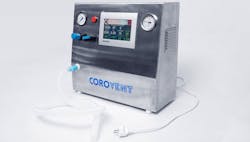From the United States, we awaited the arrival of the coronavirus with great trepidation, watching as countries overseas battled what would eventually become a global pandemic. Manufacturers raced to postpone normal operations, keeping workers safe and distanced, but many jumped at the opportunity to produce much-needed equipment and personal protective equipment (PPE).
[javascriptSnippet ]
To help prevent the collapse of the Czech healthcare system expected in the event of a steep rise in the number of coronavirus infections, the Non-conventional Ventilatory Team (NVT), headed by Prof. Karel Roubík, a member of the Faculty of Biomedical Engineering at Czech Technical University in Prague, Czech Republic, developed a prototype of the cost-effective CoroVent lung ventilator (Figure 1).
Figure 1: The Non-conventional Ventilatory Team (NVT), headed by Prof. Karel Roubík, a member of the Faculty of Biomedical Engineering at Czech Technical University in Prague, Czech Republic, developed a prototype of the cost-effective CoroVent lung ventilator.
"We don't have time to waste and have to deliver the functional device in a few days, in weeks at the most,” explains Tomáš Halva, managing director of the Beckhoff Czech Republic subsidiary, emphasizing the urgency of the project, which is supported from many different sources, including crowdfunding. “The really special thing is that a prototype became available for testing within only one week."
The development team consists of about 15 experts from various companies and universities, selected by Roubík and his colleagues through personal contacts and via the Internet. "I know one of the initiators personally, and, based on his corresponding Facebook post, I called him immediately and asked how Beckhoff could help,” explains Halva. “After all, this project will help many people and hopefully also save lives. In addition, Roubík is the best expert in the field of lung ventilators in the Czech Republic and has already successfully developed such devices for various applications in the past."
Technically, it's all about bringing together expertise from medical, electrical and pneumatic systems and doing so in the right way, says Halva. “The ventilator is specially designed for the treatment of patients with coronavirus infection, for which not every lung ventilator is suitable. In addition, limiting the ventilator to the functions necessary for coronavirus treatment and relying on free development services from the experts significantly reduce the costs of the device.”
In the team, Beckhoff is responsible for the control system, which ensures very simple device operation and thus also enables use by untrained personnel. "As free support for the project, we designed the control system and programmed the control program, including the visualization, within only one weekend,” explains Halva. “Special thanks for this go to my two colleagues Matúš Adamec and Zdenek Kosour, who are both great application engineers and programmers.”
In part 2 of this series of articles, we look at how automakers partnered up to become face mask producers.
Mike Bacidore is the editor in chief for Control Design magazine. He is an award-winning columnist, earning a Gold Regional Award and a Silver National Award from the American Society of Business Publication Editors. Email him at [email protected].
About the Author
Mike Bacidore
Editor in Chief
Mike Bacidore is chief editor of Control Design and has been an integral part of the Endeavor Business Media editorial team since 2007. Previously, he was editorial director at Hughes Communications and a portfolio manager of the human resources and labor law areas at Wolters Kluwer. Bacidore holds a BA from the University of Illinois and an MBA from Lake Forest Graduate School of Management. He is an award-winning columnist, earning multiple regional and national awards from the American Society of Business Publication Editors. He may be reached at [email protected]

Leaders relevant to this article:



